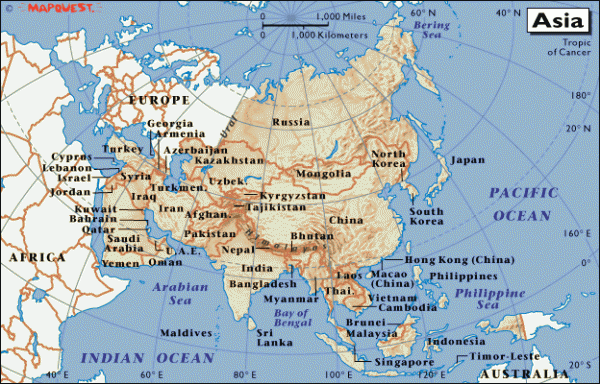
I tried not to take anything they taught me in grade nine geography class too seriously; it was one of those easy courses where the teacher read a National Geographic to herself while you coloured in maps for an hour until the bell rang. And in my eagerness to shade the shorelines, perhaps I missed the lesson that Asia does not just mean China, Taiwan, Korea, and Japan. That, in fact, it is the biggest continent on the face of the earth. I know I most definitely missed the lesson that West Asia is sometimes called the Near East or Middle East, which means that as an Asian, I have something in common with the people being racially profiled here for terrorism. Could my colouring affinity and consequent distraction have led me to believe that the term Asian only applied to folks who looked like me?
I know in Britain it is common to refer to people from Sri Lanka, India, Pakistan and Bangladesh as Asian, and people from East and South East Asia as Oriental, but then what? How do you call yourself if you are Saudi? Tajik? Lebanese?
And here, when you don’t fit into a pre-defined category, does that mean you are raceless? Or maybe you don’t exist outside of your own imagination. On Turtle Island, we don’t even extend the racial term Asian to include people the British system does. How is it that me and others with similar features got to claim the entire continent for ourselves?
Although in this liberal society, individuality and uniqueness as ideas are valued, there is something to be said for feeling like you belong to a group. As a collective, you can mobilize for political change, create and sustain a shared culture, make a blog to counteract racism. There is societal power in group identification that as individuals, racialized people just don’t seem to be privileged with. The bigger and more recognized the group, the more power it and the individuals in it have. Like Asian (and Asian-American, Asian-Canadian). That’s a pretty big and well recognized group. The Asians that our view of the category currently excludes don’t have a movement or a category of literature studies and maybe have to fill out the Other section on official forms. Yet their histories are closely linked with that of Korean, Taiwanese, Japanese and Chinese people, they share many similar forms of racism that East-Asians here have faced, and have struggles that us Official Asians can learn from.
A knowledgeable friend recently told me she heard that the word Asia/n originally meant ‘heathen’. But obviously we’ve reclaimed that one, right? So maybe it’s time for another change to the word’s meaning. After all, Asia is the biggest continent. There must be room for us all in its title, and its potential.




